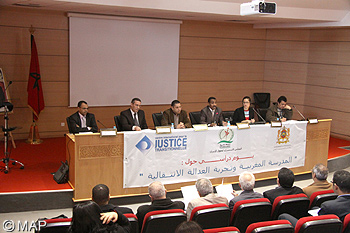LAUNCHING A REFLECTION PROCESS ON THE INTERACTION OF SCHOOL AND THE MOROCCAN EXPERIENCE IN THE FIELD OF TRANSITIONAL JUSTICE

A meeting organized by CCDH, Ministry of National Education and the International Center for Transitional Justice
The Advisory Council on Human Rights (CCDH) and the Ministry of National Education, Higher Education, Staff Training and Scientific Research, in cooperation with the International Center for Transitional Justice, started a reflection process on the best possibilities to include transitional justice in the system of education.
In this regard, a workshop, in which participated members of the Ministry of National Education and the Advisory Council’s staffs in addition to several international experts, was organized on 20 December 2010, on the following theme: “Moroccan School and Transitional Justice Experience”.
This meeting aimed to learn from the Moroccan experience in the field of transitional justice, discuss the possibilities to exploit this experience in pedagogical ways that serve the future and help build a modern society that fully respects human rights, Mr. Ahmed Taoufik Zainabi, Head of the Collective Rights and Regional Affairs Department at the Council said.
Transitional justice, he added, needs school to popularize its concepts and forward the learned lessons to the future generations to ensure the non-repetition of the grave human rights violations. School, on the other hand, needs to include the experience of the Equity and Reconciliation Commission to diverse its programs and develop curricula that support historical analysis and literature creation linked to the subjects of the transitional justice, he stated.
For his part, Mr. Khalid Fares, General Inspector of Education and Training, said human rights education is “a key element to achieve the school of success based on the principles of dignity, rights and rights linked to duties”. He indicated that the Ministry of National Education makes ever effort to make of the school an educational and dynamic space full of educational activities and practices (…) that take into consideration human rights culture.
Mr. Fares stressed that this meeting was an opportunity to deepen reflection on this field, learn of relevant international experiences and discuss the possibilities of strengthening instructors’ capacities in the field of transitional justice.
Julie Guillerot, ICTJ Country Coordinator, for her part, stated that like any truth, fight against impunity or reparations, teaching recent past is a central element of transitional justice. It is so because society needs to know and understand its past, to have common memory, in order to construct (and reconstruct) sound and equitable relations between individuals, between the different groups of society, and of course between the State and its citizens, she added.
The participants were divided into two groups each taking part in a reflection workshop; the first on “Transitional justice and education” and the second on “Capacity building of stakeholders”.
The participants of the first workshop stressed the need to deepen reflection on the reaction of school and transitional justice and issued several recommendations, mainly:
- removing human rights contradicting contents from educational books;
- deepening discussion on the challenges of including the contents of transitional justice in the system of education, mainly those relative to how such contents will be included (should it be a subject by its own or should it be included in other subjects? Taking into account transitional justice alone or include it in a subject of human rights and citizenship), etc.
- focusing on the non-repetition of past grave human rights violations;
- exploiting literature and arts;
- appointing a day to remember, to explain what happened and efforts made to establish the State of the rule of law;
- creating scientific committees to prepare the contents that can be studied, taking into consideration international experiences;
- focusing on how to change behaviors and entrench values;
Similarly, the participants of the second group issued a number of recommendations, mainly:
- defining the categories to benefit from capacity building (teachers, instructors, educators, parents associations, administrative staff, school partners);
- creating a competent working team to prepare a strategic plan targeting the different stakeholders according to the nature of their interventions;
- adopting a set of standards that should be included in the project;
- starting with typical and manageable experience.
The Advisory Council on Human Rights and the Ministry of National Education, Higher Education, Staff Training and Scientific Research signed two partnership agreements. The first one, on the promotion of human rights culture through educational and cultural dimensions, was signed in December 2005. The second, on the implementation of the Equity and Reconciliation Commission’s recommendations regarding the community reparation and the preservation of memory, was signed on 23 December 2008.






















